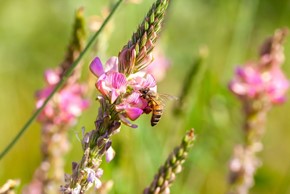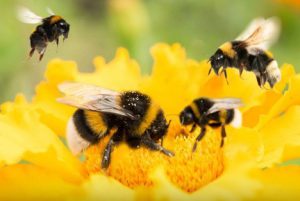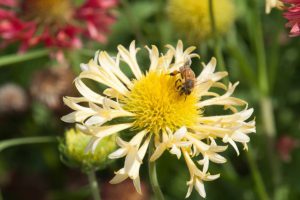Plants are flowering a month earlier – here’s what it could mean for pollinating insects
Authors
Chris Wyver PhD Candidate, Pollination and Climate Change, University of Reading
Laura Reeves PhD Candidate, Pests and Climate Change, University of Reading
Disclosure statement
Chris Wyver is a PhD student at the University of Reading. He receives funding from the Waitrose Collaborative Training Partnership and BBSRC.
Laura Reeves works for the University of Reading. she receives funding from Waitrose and BBSRC. She is affiliated with the University of Reading.

Plants are flowering about a month earlier in the UK due to climate change. That’s according scientists at the University of Cambridge, who recently analysed the first flowering dates of 406 species and found a link to warmer temperatures in spring.
The researchers compared the first flowering dates before and after 1986 and found an average shift of 26 days earlier in the year. Herbs had the largest shift (32 days) compared to shrubs and trees, which may indicate they are more responsive to climate change due to their shorter time between generations. These new findings are supported by other scientific research which has consistently found that first flowering dates have shifted over the past few decades due to rising air temperatures.
Insects out of sync
This could have a significant impact on interactions within an ecosystem and the “services” those ecosystems provide. For instance about a fifth of the UK’s crops, either by land area or value, are pollinated by insects, most significantly bees, yet this service is at risk from climatic warming.
The problem is that climate change may increase the chance of plants and pollinators becoming out of sync, with plants flowering too early in the year for the insects that pollinate them. In evolutionary biology, this is known as a “temporal mismatch”. Insects that are used to a feasting on April-flowering plants may find themselves arriving a month late if warmer temperatures mean that the plants now flower in March.
Can pollinators catch up?
Does all this mean bees and other pollinators will themselves start emerging from their “overwintering” stage earlier in the year? The trends here are less clear, though both observational and experimental studies have seen some advances. This is likely at least in part driven by climate change.
One 2020 study by US scientists found that bee activity was less sensitive to warming than was flowering time, which more closely tracked changes in the climate. This backs up other previous findings, such as research in mountainous parts of northern Japan which found that Corydalis ambigua, a plant in the poppy family, was flowering earlier in the year due to earlier snow melt, but that their pollinator bumble bees had not made a similar adjustment. This meant less pollination occurred and the plant produced fewer seeds.
To read the complete article go to;





